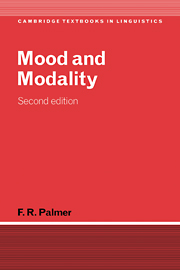Book contents
- Frontmatter
- Contents
- Preface
- Note on the text
- List of abbreviations
- 1 Introduction
- 2 Modal systems: Propositional modality
- 3 Modal systems: Event modality
- 4 Modal systems and modal verbs
- 5 Indicative and subjunctive
- 6 Realis and Irrealis
- 7 Subjunctive and irrealis
- 8 Past tense as modal
- References
- Language index
- General index
8 - Past tense as modal
Published online by Cambridge University Press: 05 June 2012
- Frontmatter
- Contents
- Preface
- Note on the text
- List of abbreviations
- 1 Introduction
- 2 Modal systems: Propositional modality
- 3 Modal systems: Event modality
- 4 Modal systems and modal verbs
- 5 Indicative and subjunctive
- 6 Realis and Irrealis
- 7 Subjunctive and irrealis
- 8 Past tense as modal
- References
- Language index
- General index
Summary
It was mentioned in 1.4.4 that past tense often has a modal function. There is, in fact a considerable body of literature that discusses this use of past tense forms to express ‘unreality’.
‘Real’ and ‘unreal’
‘Unreality’ in this sense has much in common notionally with irrealis, in that it indicates some degree of lack of confidence by the speaker, but is best treated as a different feature for several reasons. First, it is marked differently – by tense. Secondly, it co-occurs with markers of irrealis, in both mood and modality systems; in fact, ‘real’ and ‘unreal’ in this sense mark a further distinction, another parameter within a wider field of modality. Not surprisingly, its functions are often quite different from those of irrealis.
Modal-tense
‘Unreality’ is not a satisfactory term, since it is too like ‘irrealis’ and, unfortunately, the terms ‘realis’ and ‘irrealis’ have been used in traditional grammars to refer to ‘unreal conditionals’ (below, 8.3). Instead the terms that will be used are ‘modal-past’ and, where relevant, ‘modal-present’ and ‘modal-tense’.
Modal verbs
There was a discussion in 2.1.5 and 3.2.3 of the use of past tense forms of the modals to provide weaker, more tentative, forms of the judgments and directives. These are, obviously, what are now being called ‘modal-past’.
Examples of the past tense forms of may and will as tentative epistemic judgments (Speculative and Assumptive) are:
He might be there (Cf. He may be there)
He would be on holiday now (Cf. He will be on holiday now)
- Type
- Chapter
- Information
- Mood and Modality , pp. 203 - 221Publisher: Cambridge University PressPrint publication year: 2001

